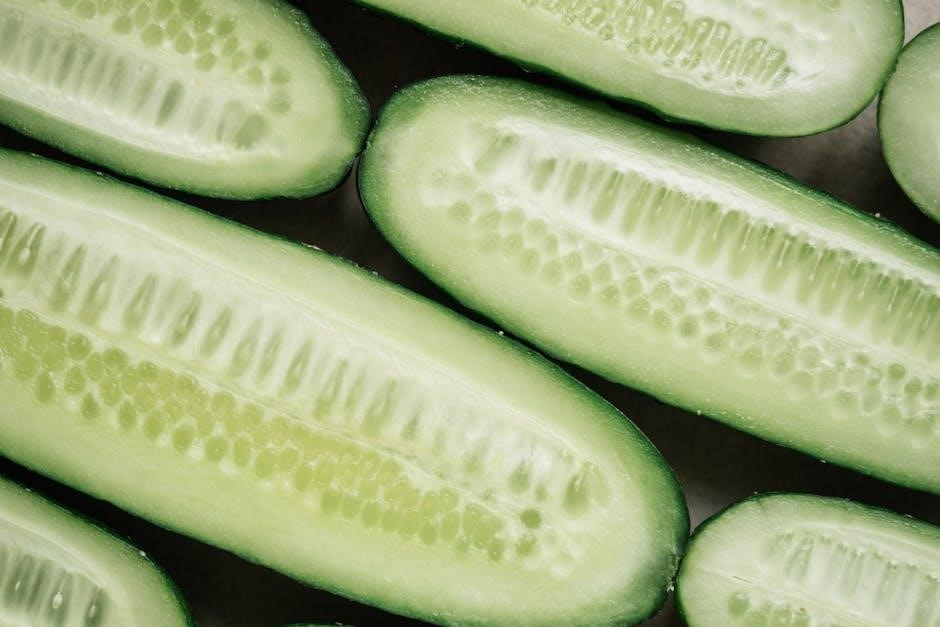Dr. Joshua Levitt’s Anti-Inflammatory Food Guide offers a comprehensive approach to nutrition, focusing on reducing inflammation through strategic food choices. As a naturopathic physician, Dr. Levitt emphasizes the importance of nutrient-rich diets to combat chronic inflammation, promoting overall well-being. His guide includes practical tips and herbal solutions, making it an accessible resource for those seeking to adopt an anti-inflammatory lifestyle. By highlighting foods like extra virgin olive oil, Dr. Levitt provides a clear path to better health.
1.1 Overview of Dr. Joshua Levitt’s Approach to Nutrition
Dr. Joshua Levitt’s approach to nutrition centers on combating inflammation through a tailored diet. A naturopathic physician, he advocates for whole, nutrient-dense foods and the elimination of pro-inflammatory triggers. His method integrates scientific research with practical advice, emphasizing the role of anti-inflammatory foods, herbs, and spices. By focusing on dietary adjustments, Dr. Levitt aims to address the root causes of inflammation, promoting long-term health and vitality. His holistic strategy is designed to empower individuals to make informed choices, fostering a balanced and sustainable lifestyle.
1.2 Importance of Reducing Inflammation in the Body
Reducing inflammation is crucial for maintaining optimal health, as chronic inflammation is linked to various diseases, including heart disease, diabetes, and arthritis. Dr. Levitt’s guide highlights how prolonged inflammation can disrupt bodily functions, leading to severe health complications. By addressing inflammation through diet, individuals can prevent these conditions and enhance their overall well-being. A balanced anti-inflammatory diet not only alleviates symptoms but also supports the body’s natural healing processes, promoting longevity and vitality. This approach underscores the importance of nutrition in managing inflammation and improving quality of life.
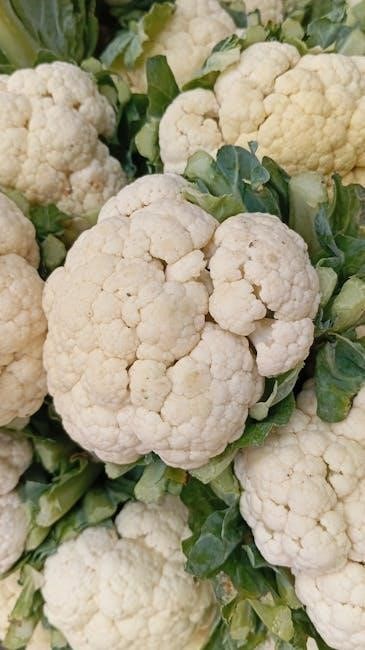
Key Principles of an Anti-Inflammatory Diet
The diet focuses on whole, nutrient-dense foods, avoiding processed items, and incorporating anti-inflammatory ingredients like olive oil, leafy greens, and fatty fish to promote health.
2.1 Understanding Chronic Inflammation and Its Impact on Health
Chronic inflammation is a prolonged immune response that can damage tissues and organs, leading to conditions like arthritis, heart disease, and diabetes. Unlike acute inflammation, which heals, chronic inflammation persists, causing oxidative stress and cellular dysfunction. It disrupts normal bodily functions, impairing digestion, joint health, and mental clarity. Over time, this inflammation can lead to chronic diseases, emphasizing the need for dietary and lifestyle interventions to mitigate its effects. Dr. Levitt’s guide highlights how specific foods can either fuel or reduce inflammation, offering a pathway to better health and disease prevention.
2.2 The Role of Nutrition in Reducing Inflammation
Nutrition plays a crucial role in managing inflammation by providing the body with essential nutrients that combat inflammatory processes. Diets rich in antioxidants and omega-3 fatty acids help reduce inflammation by neutralizing free radicals and promoting healing. These nutrients support the body’s natural defense mechanisms, potentially lowering the risk of chronic diseases associated with prolonged inflammation. By focusing on nutrient-dense foods and maintaining a balanced diet, individuals can effectively manage inflammation and improve overall health outcomes, enhancing their quality of life.
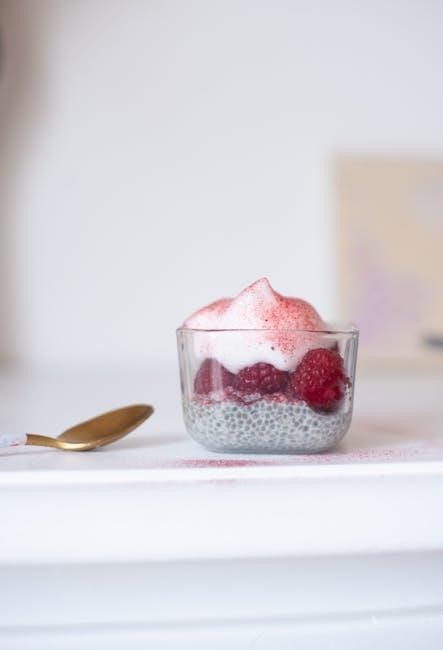
Core Foods in Dr. Levitt’s Anti-Inflammatory Diet
Dr. Levitt’s diet emphasizes core anti-inflammatory foods like extra virgin olive oil, leafy greens, berries, and fatty fish. These foods are rich in antioxidants and omega-3s, reducing inflammation and promoting overall health.
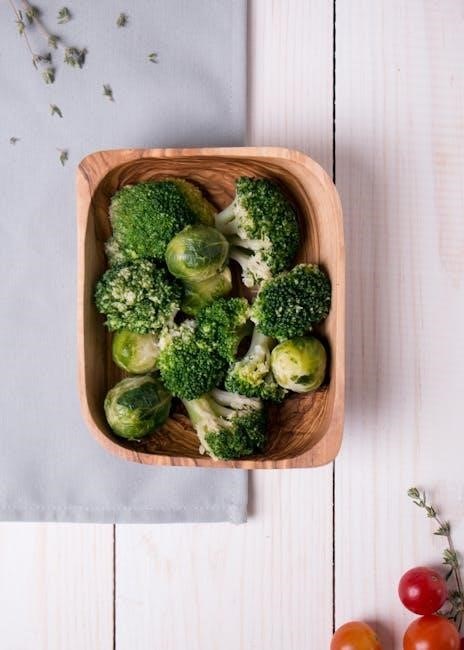
3.1 The Benefits of Extra Virgin Olive Oil
Extra virgin olive oil (EVOO) is a cornerstone of Dr. Levitt’s anti-inflammatory diet due to its potent anti-inflammatory properties. EVOO contains oleocanthal, which acts similarly to ibuprofen in reducing inflammation. Rich in antioxidants like vitamin E and polyphenols, it combats oxidative stress and inflammation. Regular consumption supports heart health, improves cognitive function, and may reduce chronic disease risk. Dr. Levitt recommends using EVOO as a primary cooking oil or salad dressing to harness its benefits. Choosing high-quality, extra virgin varieties ensures maximum nutritional value and anti-inflammatory effects.
3.2 Incorporating Leafy Greens and Their Anti-Inflammatory Properties
Leafy greens are a vital component of Dr. Levitt’s anti-inflammatory diet, offering rich stores of vitamins, minerals, and antioxidants. Spinach, kale, and collards are particularly potent, containing anti-inflammatory compounds like quercetin and kaempferol. These greens help reduce oxidative stress and inflammation by neutralizing free radicals. Regular consumption supports immune function, improves digestion, and may lower the risk of chronic diseases. Dr. Levitt recommends incorporating leafy greens into daily meals, such as salads, smoothies, or sautéed dishes, to maximize their anti-inflammatory benefits and promote overall well-being.
3.3 The Role of Berries in Reducing Inflammation
Berries are a cornerstone in Dr. Levitt’s anti-inflammatory diet due to their high antioxidant content. Rich in anthocyanins and polyphenols, berries like blueberries, raspberries, and strawberries combat inflammation by neutralizing free radicals. These compounds inhibit inflammatory pathways, reducing the risk of chronic diseases. Berries also support immune function and promote healthy cellular repair. Incorporating a variety of berries into meals, such as smoothies or salads, enhances their anti-inflammatory effects. Dr. Levitt emphasizes their versatility and potency, making them a simple yet powerful addition to an anti-inflammatory lifestyle.
3.4 Fatty Fish and Their Omega-3 Fatty Acids
Fatty fish, such as salmon, mackerel, and sardines, are rich in omega-3 fatty acids, which play a crucial role in reducing inflammation. Dr. Levitt highlights these fish as key components of an anti-inflammatory diet. Omega-3s, particularly EPA and DHA, inhibit inflammatory pathways and promote healing. Regular consumption of fatty fish supports heart health, improves brain function, and reduces the risk of chronic diseases. Incorporating these fish into meals, such as grilling or baking, provides a delicious and effective way to harness their anti-inflammatory benefits, aligning with Dr. Levitt’s recommendations for a balanced and nutritious lifestyle.
Herbs and Spices with Anti-Inflammatory Properties
Herbs and spices are natural anti-inflammatory agents, offering powerful ways to reduce inflammation without medication. Dr. Levitt highlights their role in enhancing both flavor and health benefits.
4.1 Turmeric and Curcumin: A Powerful Anti-Inflammatory Duo
Turmeric, a vibrant yellow spice, contains curcumin, a potent anti-inflammatory compound. Dr. Levitt emphasizes its natural ability to combat inflammation, often comparing its effects to ibuprofen. Curcumin works by targeting inflammatory pathways, reducing joint pain and improving overall health. Incorporating turmeric into meals or supplements can enhance anti-inflammatory benefits. Dr. Levitt recommends using high-quality turmeric powder or capsules for maximum efficacy. This natural duo is a cornerstone in his guide, offering a safe and effective way to manage inflammation without harsh side effects.
4.2 Ginger: A Natural Anti-Inflammatory Agent
Ginger, a versatile root, is renowned for its anti-inflammatory properties, particularly due to its active compounds like gingerols. Dr. Levitt highlights ginger as a natural remedy for reducing inflammation and alleviating pain. It can be consumed fresh, powdered, or as tea, making it easy to incorporate into daily meals. Ginger’s anti-inflammatory effects are well-documented, supporting joint health and digestive well-being. Its versatility in both sweet and savory dishes adds to its appeal. By including ginger in your diet, you can harness its natural anti-inflammatory benefits, aligning with Dr. Levitt’s recommendations for a healthier lifestyle.
4.3 Garlic and Its Compounds for Inflammation Reduction
Garlic is a potent anti-inflammatory agent, thanks to its active compound, allicin, which has been shown to reduce inflammation and improve cardiovascular health. Dr. Levitt often recommends incorporating garlic into meals due to its ability to combat oxidative stress and inflammation. Its sulfur-containing compounds not only enhance flavor but also support immune function. Whether raw, cooked, or aged, garlic offers versatile health benefits. Adding garlic to your diet can help mitigate chronic inflammation, aligning with Dr. Levitt’s approach to using whole foods for optimal wellness. Its accessibility makes it a simple yet effective addition to an anti-inflammatory lifestyle.
Foods to Avoid in an Anti-Inflammatory Diet
Dr. Levitt recommends avoiding red meat, processed foods, and dairy, as they can trigger inflammation. These foods often contain pro-inflammatory compounds that hinder healing and overall health.
5.1 Red Meat and Its Pro-Inflammatory Effects
Red meat, particularly processed varieties, is known to trigger inflammation due to compounds like advanced glycation end (AGE) products and saturated fats. These substances can activate inflammatory pathways in the body, exacerbating conditions like arthritis and cardiovascular disease. Dr. Levitt suggests limiting red meat consumption, especially processed options such as sausages and bacon, which contain added preservatives like sodium nitrate. These additives can lead to oxidative stress and further inflammation. Opting for lean, grass-fed meats in moderation is a healthier alternative, but avoiding red meat altogether is ideal for those with chronic inflammation.
5.2 Processed Foods and Their Impact on Inflammation
Processed foods are a significant contributor to inflammation due to their high content of refined sugars, artificial additives, and unhealthy fats. These ingredients trigger inflammatory responses in the body, worsening conditions like heart disease and diabetes. Dr. Levitt emphasizes avoiding foods such as packaged snacks, sugary beverages, and frozen meals, which are often loaded with pro-inflammatory agents. Regular consumption of these items can lead to chronic inflammation, making it essential to opt for whole, nutrient-rich foods instead. By eliminating processed foods, individuals can significantly reduce their inflammatory burden and improve overall health outcomes.
5.3 Dairy Products and Potential Inflammatory Responses
Dairy products can trigger inflammatory responses in some individuals, particularly those with lactose intolerance or sensitivity to proteins like casein. Dr. Levitt highlights that dairy-derived inflammation may contribute to conditions such as acne, digestive issues, and joint pain. While not everyone reacts negatively to dairy, opting for organic, grass-fed sources or plant-based alternatives like almond or coconut milk can help minimize inflammatory risks. Moderation is key, as excessive dairy consumption may exacerbate inflammation in sensitive individuals, making mindful choices crucial for maintaining an anti-inflammatory diet.

The Science Behind Anti-Inflammatory Diets
Anti-inflammatory diets work by modulating the body’s inflammatory pathways, reducing oxidative stress, and promoting the production of anti-inflammatory molecules. This approach targets the root causes of inflammation, leveraging nutrients and compounds found in specific foods to create a balanced physiological response, ultimately supporting long-term health and well-being.
6.1 How Diet Affects Inflammatory Pathways in the Body
Diet plays a crucial role in modulating inflammatory pathways by influencing the production of pro-inflammatory and anti-inflammatory molecules. Foods rich in antioxidants, such as leafy greens and berries, help neutralize free radicals, reducing oxidative stress and inflammation. Omega-3 fatty acids from fatty fish inhibit the production of pro-inflammatory eicosanoids, while anti-inflammatory compounds like curcumin in turmeric directly suppress inflammatory pathways. Conversely, processed foods and red meat can trigger pro-inflammatory responses by activating pathways like NF-kB. A balanced diet, as outlined in Dr. Levitt’s guide, helps maintain equilibrium, reducing chronic inflammation and promoting overall health.
6.2 The Role of Antioxidants in Combating Inflammation
Antioxidants play a vital role in combating inflammation by neutralizing free radicals, which are unstable molecules that trigger oxidative stress and inflammation. Foods rich in antioxidants, such as berries, leafy greens, and extra virgin olive oil, help mitigate this process. Polyphenols, a class of antioxidants, inhibit inflammatory enzymes and cytokines, reducing inflammation at its source. By incorporating these nutrients, individuals can effectively lower oxidative stress and chronic inflammation, promoting a healthier inflammatory response. Dr. Levitt’s guide emphasizes the importance of antioxidant-rich diets in maintaining long-term health and preventing inflammation-related diseases.
Benefits of Following Dr. Levitt’s Food Guide
Following Dr. Levitt’s guide reduces chronic inflammation, lowering the risk of diseases like heart disease and diabetes. It improves mental clarity and mood, enhancing overall well-being. Incorporating anti-inflammatory foods supports digestive health, boosting nutrient absorption and energy levels. Adopting this diet promotes a healthier lifestyle, reducing inflammation and improving long-term health outcomes.
7.1 Reduction in Chronic Disease Risk
Adhering to Dr. Levitt’s Anti-Inflammatory Food Guide significantly reduces the risk of chronic diseases. By focusing on nutrient-dense, anti-inflammatory foods, individuals can lower their likelihood of developing conditions like heart disease, diabetes, and certain cancers. Chronic inflammation is a major contributor to these diseases, and Dr. Levitt’s approach targets this root cause. Incorporating foods rich in antioxidants and omega-3 fatty acids helps mitigate inflammation, promoting long-term health. This dietary strategy not only reduces disease risk but also enhances overall well-being, making it a sustainable choice for preventing chronic illnesses and maintaining optimal health.
7;2 Improved Mental Health and Cognitive Function
Dr. Levitt’s Anti-Inflammatory Food Guide highlights the profound impact of diet on mental health and cognitive function. By reducing inflammation, the guide helps alleviate symptoms of depression, anxiety, and brain fog. Foods rich in antioxidants, such as berries, and omega-3 fatty acids from fatty fish support brain health, enhancing mental clarity and mood. The anti-inflammatory approach also promotes a healthy gut-brain axis, further improving emotional well-being and cognitive performance. This dietary strategy not only supports mental health but also fosters long-term brain resilience, making it a valuable tool for maintaining sharp mental function and overall emotional balance.
7.3 Enhanced Digestive Health
Dr. Joshua Levitt’s Anti-Inflammatory Food Guide emphasizes the role of diet in improving digestive health. By focusing on anti-inflammatory foods like leafy greens, berries, and healthy fats, the guide helps reduce inflammation in the gut. This approach can alleviate conditions such as IBS and leaky gut syndrome, promoting a balanced gut microbiome. The diet’s emphasis on fiber-rich foods supports regular bowel movements and prevents digestive disorders. Additionally, anti-inflammatory compounds found in ingredients like turmeric and ginger aid in soothing the digestive tract, enhancing nutrient absorption and overall gut function. A healthy digestive system is foundational to long-term well-being.
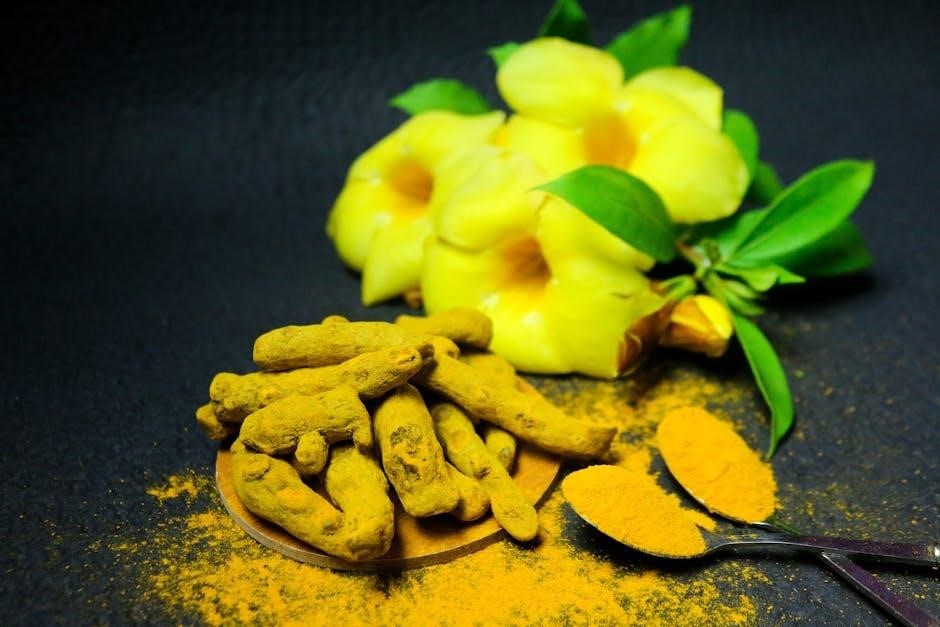
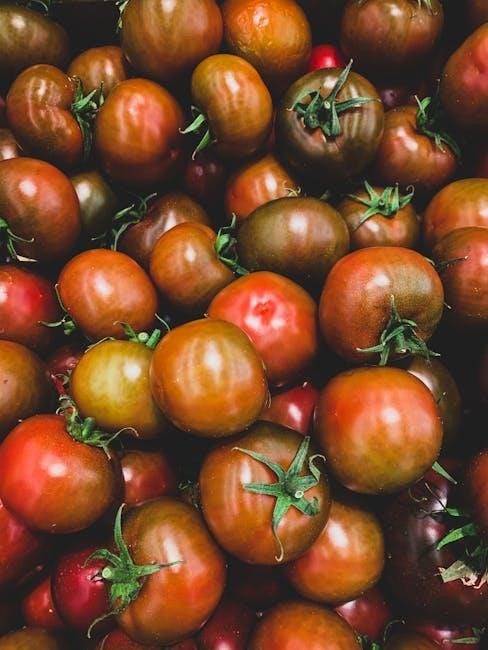
Practical Tips for Implementing the Diet
Plan meals with anti-inflammatory foods, shop for fresh ingredients, and incorporate herbs like turmeric and ginger. Use extra virgin olive oil for cooking and dressings.
8.1 Meal Planning Strategies for Success
Effective meal planning is crucial for adhering to Dr. Joshua Levitt’s anti-inflammatory diet. Start by creating a weekly meal calendar, focusing on incorporating anti-inflammatory foods like leafy greens, fatty fish, and berries. Plan meals around fresh, seasonal ingredients to ensure variety and nutrient density. Consider batch cooking to save time and reduce the temptation of processed foods. Use herbs and spices like turmeric and ginger to enhance flavor without inflammation. Keep a grocery list handy to stay organized and ensure you have the necessary ingredients on hand. Simple, balanced recipes can make the transition to this diet enjoyable and sustainable.
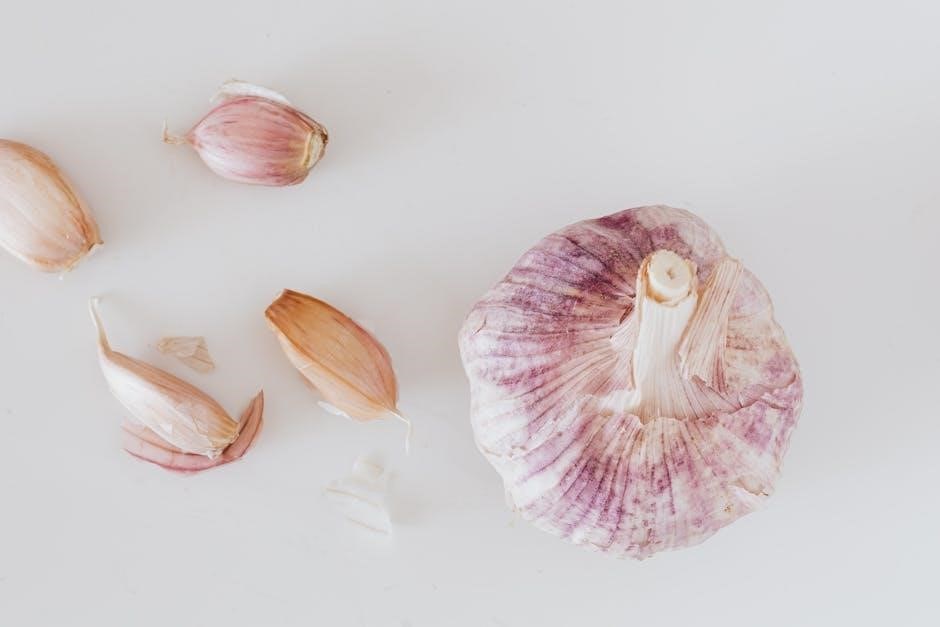
8.2 Shopping Tips for Anti-Inflammatory Foods
- Shop the perimeter of the grocery store to focus on fresh, whole foods like fruits, vegetables, and lean proteins.
- Opt for organic options to avoid pesticides and harmful chemicals that may trigger inflammation.
- Read food labels to avoid pro-inflammatory ingredients like added sugars, artificial additives, and refined grains.
- Buy in bulk: nuts, seeds, and spices like turmeric and ginger are staples in an anti-inflammatory diet.
- Choose pre-washed, pre-chopped greens for convenience, ensuring you incorporate leafy greens daily.
- Select wild-caught fatty fish and grass-fed meats to maximize omega-3 intake and reduce inflammation.
- Stock up on extra virgin olive oil for its potent anti-inflammatory properties.
8.3 Simple Recipes to Get Started
Begin with a Turmeric Ginger Soup: sauté onions, garlic, and ginger, then add turmeric, coconut milk, and vegetable broth. Simmer and blend for a soothing, anti-inflammatory meal.
Try a Berry Spinach Salad: mix fresh spinach, berries, walnuts, and a drizzle of olive oil for a nutrient-packed, anti-inflammatory treat.
Grill fatty fish like salmon with a marinade of olive oil, lemon, and herbs for a rich source of omega-3s.
Make a Green Smoothie with spinach, avocado, and berries for a quick, inflammation-fighting breakfast.
These recipes are easy, delicious, and align with Dr. Levitt’s anti-inflammatory principles.

Lifestyle Factors That Support an Anti-Inflammatory Diet
Lifestyle factors such as staying hydrated, regular exercise, and effective stress management complement Dr. Levitt’s anti-inflammatory diet, enhancing its benefits and promoting overall health.
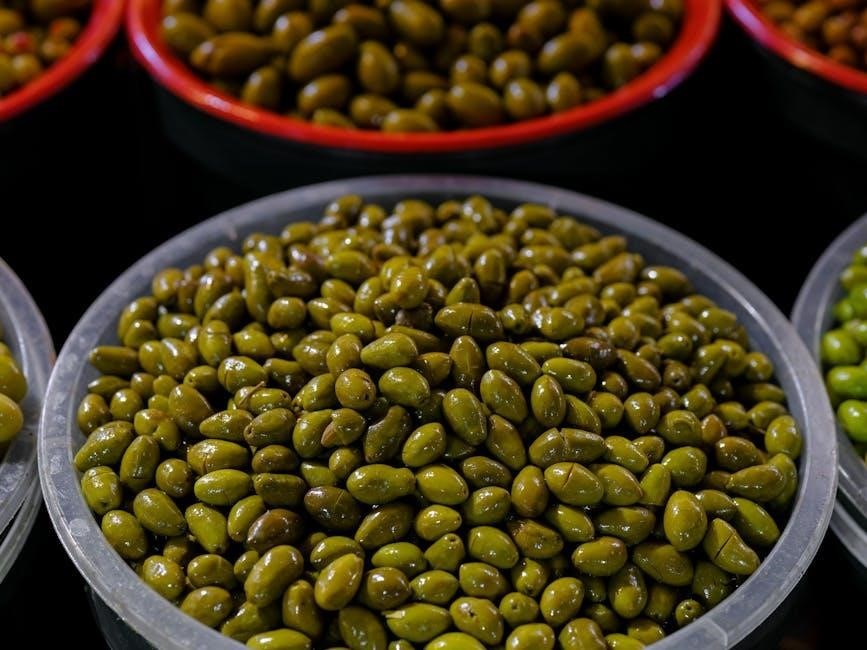
9.1 The Importance of Hydration
Hydration plays a crucial role in supporting an anti-inflammatory diet by facilitating bodily functions and detoxification. Dr. Joshua Levitt emphasizes the need to drink plenty of water daily, as it helps maintain cellular health and reduce inflammation. Proper hydration ensures nutrients are efficiently absorbed and waste products are eliminated, which is essential for minimizing inflammatory responses. Incorporating water-rich foods, such as fruits and vegetables, can also contribute to overall hydration levels. Staying hydrated not only supports physical health but also enhances mental clarity and energy, making it a cornerstone of Dr. Levitt’s anti-inflammatory lifestyle recommendations.
9.2 Exercise and Its Role in Reducing Inflammation
Regular physical activity is a key component of Dr. Joshua Levitt’s anti-inflammatory lifestyle. Exercise helps reduce chronic inflammation by improving circulation, boosting immune function, and enhancing the body’s natural anti-inflammatory processes. Moderate-intensity exercises, such as walking or swimming, are particularly effective. Physical activity also promotes the release of anti-inflammatory cytokines, which help mitigate inflammation. By incorporating exercise into daily routines, individuals can complement their dietary efforts, creating a holistic approach to reducing inflammation and improving overall health. Dr. Levitt emphasizes that consistency is essential for long-term benefits.
9.3 Stress Management Techniques
Stress management plays a vital role in Dr. Joshua Levitt’s anti-inflammatory approach. Chronic stress triggers inflammation, so techniques like meditation, yoga, and deep breathing are recommended. These practices help reduce cortisol levels, a hormone linked to inflammation. By incorporating mindfulness and relaxation exercises, individuals can better manage stress, promoting a balanced inflammatory response. Dr. Levitt emphasizes the importance of consistency in these practices to maintain long-term benefits. Stress reduction complements dietary changes, creating a holistic strategy to combat inflammation and improve overall well-being.
Common Mistakes to Avoid
Overconsumption of processed foods, ignoring portion sizes, and not reading food labels are common mistakes that can hinder anti-inflammatory progress. Avoiding these pitfalls is crucial for success.
10.1 Overconsumption of Processed Foods
Consuming too many processed foods is a common mistake that can undermine an anti-inflammatory diet. These foods often contain pro-inflammatory additives, preservatives, and unhealthy fats that trigger inflammation. Examples include sugary snacks, refined grains, and packaged meals. Dr. Levitt’s guide emphasizes avoiding such items, as they can negate the benefits of anti-inflammatory choices. Regularly eating processed foods can lead to chronic inflammation, increasing the risk of diseases like arthritis and heart conditions. To avoid this, focus on whole, nutrient-dense foods and limit reliance on convenience or pre-packaged items.
10.2 Ignoring Portion Sizes
Ignoring portion sizes is another common pitfall in an anti-inflammatory diet. Even healthy foods, when consumed in excess, can lead to inflammation. Overeating can result in an imbalance of nutrients, potentially triggering inflammatory responses. Dr. Levitt’s guide stresses the importance of moderation, even with beneficial foods like fatty fish or olive oil. Using smaller plates and measuring portions can help maintain balance. Mindful eating and awareness of serving sizes are crucial to avoid overconsumption, ensuring the diet remains effective in reducing inflammation and promoting overall health.
10.3 Not Reading Food Labels
Not reading food labels is a significant oversight in an anti-inflammatory diet. Many seemingly healthy products contain hidden pro-inflammatory ingredients like added sugars, artificial flavors, and preservatives. Dr. Levitt’s guide emphasizes the importance of scrutinizing labels to avoid such additives. Even foods marketed as “healthy” can harbor inflammatory compounds, undermining dietary efforts. By neglecting to read labels, individuals may inadvertently consume harmful substances, hindering their progress toward reducing inflammation. Awareness and diligence in label reading are essential to maintaining a truly anti-inflammatory diet and achieving long-term health benefits.
Dr. Joshua Levitt’s Anti-Inflammatory Food Guide provides a clear, effective path to reducing inflammation through diet, promoting long-term health and well-being with practical, nutrient-rich strategies.
11.1 Summary of Key Takeaways
Dr. Joshua Levitt’s Anti-Inflammatory Food Guide emphasizes the importance of nutrition in reducing inflammation. Key takeaways include prioritizing anti-inflammatory foods like olive oil, leafy greens, berries, and fatty fish, while avoiding pro-inflammatory options such as red meat and processed foods. The guide also highlights the role of hydration, exercise, and stress management in supporting overall health. By focusing on nutrient-rich diets and lifestyle changes, individuals can effectively combat chronic inflammation, leading to improved mental health, digestive function, and a reduced risk of chronic diseases. This approach provides a holistic path to long-term well-being.
11.2 Encouragement to Start the Anti-Inflammatory Journey
Embracing Dr. Joshua Levitt’s Anti-Inflammatory Food Guide is a transformative step toward better health. By focusing on nutrient-rich foods and simple lifestyle changes, you can reduce inflammation and enhance your overall well-being. The guide offers practical strategies, making it easy to incorporate anti-inflammatory principles into daily life. Start with small changes, like adding olive oil or berries to your meals, and gradually adopt more habits. Remember, every step forward is a commitment to your health. With patience and consistency, you can achieve a balanced, inflammation-free lifestyle that fosters long-term vitality and resilience.
